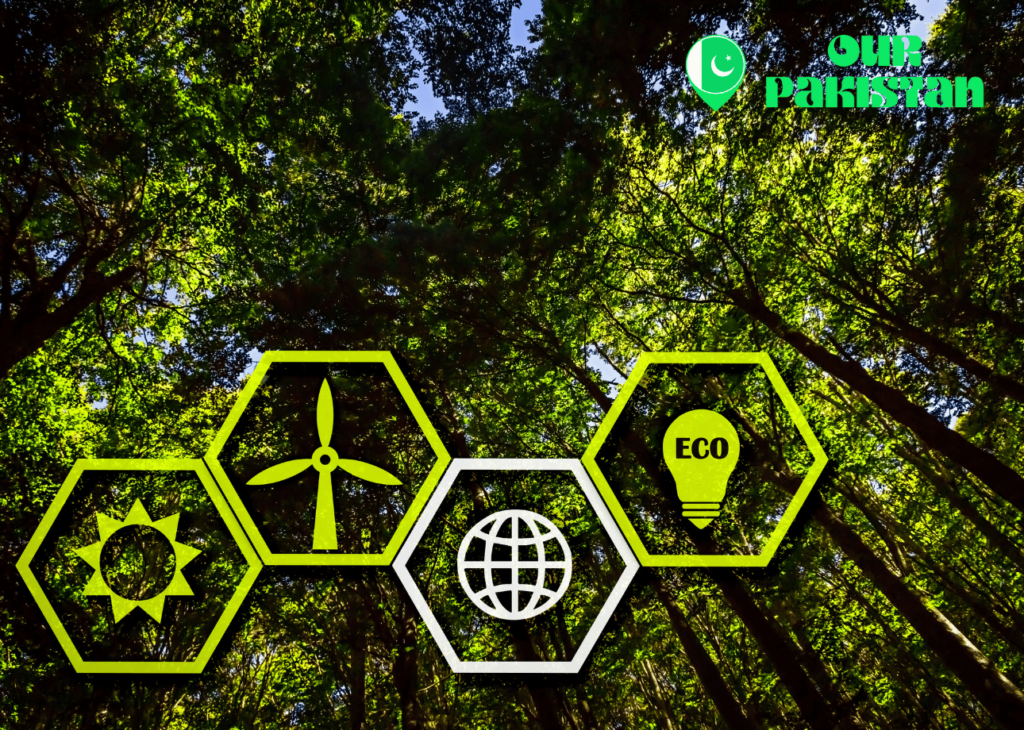In today’s world, the pressing issue of climate change requires urgent action from individuals, communities, and nations. Green technology, often referred to as clean technology, plays a crucial role in addressing these challenges and ensuring a sustainable future. By harnessing innovative solutions and integrating them into various sectors, green tech initiatives aim to minimize the harmful impact on the environment while promoting progress.
Pakistan, a developing country facing numerous environmental challenges, has recognized the importance of green technology in mitigating the adverse effects of climate change. With a population of over 200 million people, Pakistan’s natural resources are under immense pressure. However, the country has made commendable strides in adopting green tech initiatives to overcome these challenges and promote sustainability.
Environmental Challenges in Pakistan
Pakistan, like many other nations, faces significant environmental challenges that require concerted efforts to address. One of the most pressing issues is pollution, particularly air and water pollution. Rapid industrialization and urbanization have resulted in deteriorating air quality and contaminated water sources, endangering the health and well-being of millions of Pakistanis.

Furthermore, climate change poses a severe threat to Pakistan’s ecosystem. Rising global temperatures have led to melting glaciers in the northern regions, causing water scarcity during crucial agricultural seasons. Additionally, deforestation exacerbates the problem, as it contributes to soil degradation and increases the risk of natural disasters such as floods and landslides.
The Rise of Green Technology
Green technology, also known as environmental technology or eco-technology, refers to innovative methods, processes, and products that promote sustainability and minimize the negative impact on the environment. It encompasses a broad range of sectors, including energy, waste management, agriculture, transportation, and construction. The significance of green technology lies in its potential to address environmental concerns while fostering economic growth and social development.
Green technology plays a vital role in environmental conservation and sustainable development. By shifting towards renewable energy sources such as solar, wind, and hydro power, countries like Pakistan can significantly reduce their dependence on fossil fuels, thereby minimizing greenhouse gas emissions. Additionally, green tech initiatives promote efficient waste management, sustainable agriculture practices, eco-friendly infrastructure, and the adoption of electric vehicles, all of which contribute to a healthier planet and long-term sustainability.
Government Initiatives
Recognizing the importance of green technology, the Government of Pakistan has implemented various policies and programs to drive the adoption of sustainable practices across sectors. The National Climate Change Policy outlines the country’s commitment to reducing greenhouse gas emissions, promoting renewable energy, and enhancing adaptive capacities to climate change impacts. Furthermore, the government has established the Alternative Energy Development Board (AEDB) to facilitate the growth of renewable energy projects and provide financial incentives for clean energy investments.
The government’s investment in renewable energy projects has been a significant driving force behind Pakistan’s green technology initiatives. With an aim to reduce its reliance on fossil fuels and combat climate change, Pakistan has made substantial progress in expanding its renewable energy capacity. This includes the development of solar parks, wind farms, and hydropower projects, which not only contribute to the country’s energy needs but also reduce carbon emissions and promote sustainable development. Moreover, the government emphasizes the importance of constructing green buildings and eco-friendly infrastructure, incentivizing environmentally responsible practices in the construction sector.
Renewable Energy
Pakistan’s abundance of natural resources has positioned the country favorably for harnessing renewable energy sources. The introduction of solar parks, wind farms, and the utilization of hydropower potential have been key advancements in the renewable energy sector. Solar power projects in Punjab and Balochistan have significantly contributed to the national grid, while wind power farms in Sindh and Gharo have expanded the country’s clean energy capacity. Additionally, Pakistan’s potential for hydropower generation from its rivers and dams presents a promising avenue for sustainable energy production.

Numerous projects and initiatives in Pakistan are actively promoting the adoption of clean energy. The Quaid-e-Azam Solar Park, the largest solar energy project in the country, has made a substantial impact by utilizing solar panels to generate electricity. Moreover, the China-Pakistan Economic Corridor (CPEC) has resulted in the development of multiple renewable energy projects, including the Jhimpir wind power corridor. These efforts are crucial steps towards reducing Pakistan’s carbon footprint and embracing a renewable energy future.
Waste Management Solutions
Pakistan’s waste management solutions have undergone significant innovation to address the increasing environmental concerns. The introduction of waste-to-energy plants, which convert solid waste into electricity, has proven to be an effective method of combating both waste accumulation and energy scarcity. Furthermore, recycling initiatives have been implemented to reduce the amount of waste reaching landfills, promoting resource conservation and minimizing the environmental impact of waste disposal.
The traditional practice of open dumping has had a detrimental effect on Pakistan’s environmental health. In response, the government and private sector have established sanitary landfill sites and waste treatment facilities, ensuring proper waste segregation and disposal. By reducing the environmental impact of waste disposal, Pakistan is taking significant steps toward a cleaner and healthier environment.
Sustainable Agriculture
To overcome the challenges faced by its agricultural sector, Pakistan has embraced modern practices and technologies that promote sustainability. Drip irrigation systems, for instance, minimize water waste and ensure efficient water use in crop irrigation. Integrated pest management techniques reduce the reliance on harmful pesticides, minimizing environmental hazards. Additionally, precision agriculture, which uses advanced technologies like GPS and remote sensing, allows farmers to make informed decisions regarding water and fertilizer usage, resulting in optimal crop yields and reduced environmental impact.
Pakistan’s agricultural sector is essential for its economy and food security. To improve crop yields while minimizing environmental impact, various initiatives have been introduced. These include the promotion of organic farming methods, the implementation of water-saving techniques, and the development of climate-resilient crop varieties. By adopting sustainable agricultural practices, Pakistan aims to enhance food production, reduce soil degradation, and safeguard the environment for future generations.
Green Building and Infrastructure
The construction and operation of buildings account for a significant portion of energy consumption and greenhouse gas emissions. In response, Pakistan has embraced green building concepts and sustainable architecture. LEED (Leadership in Energy and Environmental Design) certification, which encourages energy efficiency, water conservation, and waste reduction, has gained popularity. Furthermore, sustainable design principles, such as the incorporation of natural lighting, energy-efficient materials, and smart technologies, are being implemented in new construction projects throughout the country.
Pakistan’s focus on energy efficiency and eco-friendly infrastructure development is evident in the construction of new infrastructure projects. The Lahore Metro Bus System, for example, incorporates energy-efficient technologies, such as regenerative braking systems, to reduce energy consumption and carbon emissions. Additionally, the construction of eco-parks and green spaces enhances urban biodiversity, improves air quality, and provides recreational areas for the public. These energy-efficient and eco-friendly developments pave the way for a greener and more sustainable Pakistan.
Transportation and E-Mobility
Pakistan’s transportation sector is a significant contributor to air pollution and carbon emissions. In an effort to combat these issues, the country is making progress in adopting electric vehicles (EVs) and e-mobility solutions. The government has introduced tax incentives and policies to promote the use of EVs, leading to an increase in their adoption. Moreover, the establishment of EV charging infrastructure across major cities is facilitating the transition from conventional vehicles to cleaner and more sustainable alternatives.
By promoting electric vehicles and e-mobility solutions, Pakistan aims to reduce carbon emissions in the transportation sector. Not only do EVs produce zero tailpipe emissions, but they also have lower maintenance costs and contribute to reducing dependence on imported fossil fuels. Additionally, the use of public transportation systems and the integration of eco-friendly transportation options, such as cycling lanes and pedestrian-friendly spaces, further aid in reducing carbon emissions and promoting sustainable urban mobility.
Community Participation and Awareness
The active participation of communities is crucial in promoting green practices and sustainability. In Pakistan, numerous community-based organizations and initiatives are working tirelessly to raise awareness and drive positive change. Whether it is organizing tree plantation drives, promoting recycling practices, or advocating for environmentally friendly policies, community engagement plays a pivotal role in fostering a culture of sustainability.
Education and awareness campaigns are essential in creating a mindset shift towards embracing green technology. From schools to universities, efforts are being made to educate the public about the importance of sustainable practices and the role of green technology in mitigating climate change. Awareness campaigns, workshops, and seminars are organized to equip individuals with knowledge and empower them to make environmentally conscious choices.
Read More About
Education For Women
Top Universities of Pakistan

Challenges and Opportunities
While Pakistan has made significant progress in adopting green tech initiatives, certain challenges still persist. Limited financial resources, technological barriers, and policy implementation gaps pose hurdles in the widespread adoption of sustainable practices. Additionally, the need for capacity building, skill development, and research and development require further attention. Addressing these challenges is crucial for ensuring the successful implementation of green tech initiatives across the country.
Despite the challenges, Pakistan has immense opportunities for further advancements and collaborations in the green technology sector. The country’s strategic location and solar potential offer prospects for renewable energy exports and investment. Collaborations with international organizations, development partners, and the private sector can facilitate knowledge sharing, technology transfer, and financial support, fostering sustainable development and progress.
Success Stories
Several notable success stories highlight the positive impact of green tech projects in Pakistan. The Quaid-e-Azam Solar Park, mentioned earlier, has already made a significant contribution to the country’s energy needs while reducing carbon emissions. The Clean and Green Pakistan campaign, initiated by the government, has successfully mobilized communities to actively participate in tree plantation drives, waste management, and cleanliness initiatives. These success stories are a testament to Pakistan’s commitment to sustainability and the transformative power of green technology.
Pakistan’s journey towards sustainability is marked by inspiring examples of achievements. The Billion Tree Tsunami project in Khyber Pakhtunkhwa province has successfully reforested vast areas, restoring ecosystems and combating deforestation. The Sukkur Institute of Business Administration (IBA) solar energy project has significantly reduced the institute’s reliance on conventional energy sources, fostering energy independence and environmental sustainability. These achievements demonstrate Pakistan’s potential to lead by example and inspire other nations in their pursuit of sustainability.
Collaborations and Partnerships
Ensuring the success of green initiatives requires collaborations and partnerships between the government, private sector, and international organizations. The Government of Pakistan actively engages with stakeholders, including private companies and non-governmental organizations, to promote a conducive environment for green technology investments and innovation. Additionally, collaborations with international organizations and development partners facilitate the exchange of best practices and financial support, enabling the implementation of large-scale green projects.
Recognizing that environmental challenges transcend borders, Pakistan actively participates in global efforts to combat climate change and promote sustainable development. The country engages in multilateral agreements, such as the Paris Agreement, and contributes to global forums to share experiences and learn from other countries best practices. International partnerships enable Pakistan to learn from other’s experiences, share its own expertise, and collectively work towards a greener and more sustainable future for the entire planet.
Conclusion
Green tech initiatives have emerged as powerful tools in addressing environmental challenges and ensuring a sustainable future for our planet. Pakistan’s efforts in adopting green technology and promoting sustainability serve as a prime example of the transformative impact that can be achieved through collective action. By embracing renewable energy, implementing innovative waste management solutions, promoting sustainable agriculture practices, and developing eco-friendly infrastructure, Pakistan is paving the way toward a greener and more resilient future.
While significant strides have been made, there is still much work to be done. It is imperative that individuals, communities, governments, and businesses continue their efforts towards environmental preservation and progress. Through continued support for green tech initiatives, increased public awareness, and collaboration on a global scale, we can collectively overcome the environmental challenges we face and build a sustainable world that future generations will thrive in. Let us all play our part in creating a greener, cleaner, and more sustainable future for all.